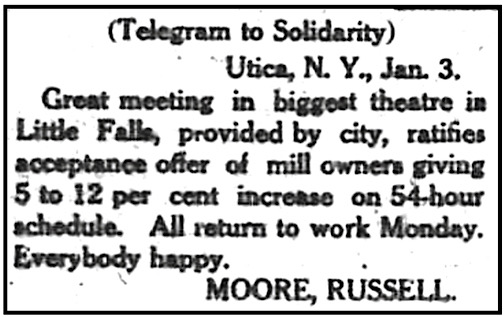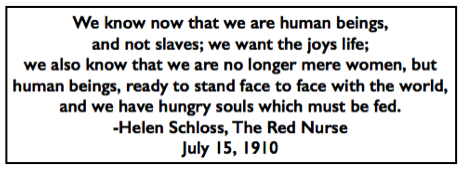
—————
Hellraisers Journal – Sunday January 12, 1913
Little Falls Textile Strikers Celebrate Great Victory at Mass Meeting
From the Spokane Industrial Worker of January 9, 1913:
[Little Falls Strike Prisoners Remain at Herkimer County Jail]

Hellraisers Journal – Sunday January 12, 1913
Little Falls Textile Strikers Celebrate Great Victory at Mass Meeting
From the Spokane Industrial Worker of January 9, 1913:
[Little Falls Strike Prisoners Remain at Herkimer County Jail]
 —————
—————
Hellraisers Journal – Wednesday January 1, 1913
“On the Picket Line at Little Falls, New York” by Big Bill Haywood, Part I
From the International Socialist Review of January 1913:
[Part I of II.]
WITH facts for a fulcrum and sentiment for a lever, we can move the world!
The world of labor is being slowly moved by economic conditions such as present themselves at Little Falls, N. Y., where women and children and men are struggling for bread. The facts regarding the situation there inspired Helen Keller, the world’s prodigy, to give voice to the heart pulses expressed in the letter printed on the opposite page.
By the rarest good chance John Macy, whose wife is the teacher and companion of Helen Keller, came to Little Falls. A member of the Industrial Workers of the World, he took up his part of the battle by getting the books and accounts of the strikers in shape, by writing articles and reports. It was through him and other mediums that the details of the strike and its attendant miseries reached the blind girl at her pleasant home at Wrentham, Mass. Sitting at her desk and surveying the mysterious lines in “The Hand of the World,” she sees what philosophers, politicians and priests cannot see; have never seen. She reads unerringly the destiny of labor. Understanding the need of toil, she reaches out and puts in the hand of the world, not a dole of charity but a token of love-part of labor’s own.
John Macy read her letter to the strikers at a regular meeting held at Slavoc Sokel hall. Helen Keller has never spoken to such an audience before. There were none but workers there, men and women, boys and girls, who knew but little English and were of many tongues.
It was explained to them that they were listening to the words of a girl who was deaf and blind; one who had overcome afflictions more severe than their own. They could not understand the meaning of many of her words. But they were like a mother’s crooning, soothing a wounded child. The letter was a heartfelt greeting from a sincere friend. They felt the sentiment and the sympathy it contained. Their eyes streamed with tears. They burst into a hearty cheer. Helen Keller will get a set of resolutions signed by the strikers in many languages.
She may never see the embossed words or names attached to the resolutions, but she will know their meaning-they are written by “The Hand of the World.”
Other remarkable letters were received by the strikers, one from a “friend” who had been saving his money to buy an overcoat. He had laid by ten dollars. He sent it all to the strikers saying he could get along without an overcoat if the money would help the strikers to win more bread. It is such sentiment and support that has instilled in the Little Falls strikers the spirit of solidarity that knows no defeat.
Some who sympathize with the Industrial Workers of the World principles and methods have sent letters with money and others have come in person to render what assistance they can to the strikers.
After the trouble precipitated by the police on October 30th, last, the organizers on the ground, Ben J. Legere and Phillipo Bocchino, with nearly all the members of the strike committee, were thrown into jail where they have been held ever since, awaiting the action of of the grand jury.
After a farcical hearing, Legere and Bocchino were committed to jail and held for bail of $15,000. Murlando, one of the strikers, was held in the sum of $10,000 and the others in some instances ranging from $50 to $5,000. The story of the so-called riot was told in the following proclamation issued by the strikers:
The blood-thirsty, murderous cossacks have shown their hand.
Police thugs of Little Fall throw off the mask and do the dirty work for the gang of bloodsuckers who own the mills in Little Falls.
Today in Little Falls was seen a spectacle which has not been witnessed before anywhere outside of Russia.
Today the gang of fiends in human form who wear the disgraceful uniform of the police in Little Falls, deliberately went to work and started a riot.
It was the most brutal, cold-blooded act ever done in these parts. Nothing under heaven can ever justify it and the soul of the degenerate brute who started it will shrivel in hell long, long before the workers will ever forget this day.
The workers in the mills of Little Falls have been on strike for four weeks against an inhuman oppression of the mill-bosses. An incompetent law has been used by these mill-owners to reduce the wages of the workers from fifty cents to two dollars a week.
Hundreds of these workers were already existing on a starvation wage averaging about $7 per week.
They resisted this robbery by the mill-owners.
They went on strike.
The police showed at the beginning that the filthy money of the mill-owners can corrupt all authority by attempting to suppress free speech in Little Falls. Several speakers were arrested. Then the strikers organized in the Industrial Workers of the World.
They began peaceful picketing at the mills where many American workers, mostly girls, were playing the part of scabs.
The strikers, with a band and banners bearing appeals for support, began to parade each morning before the mills to encourage the other workers to come out. They did not interfere with the scabs in any way and by this means of peaceful demonstration the strikers won over every day some of those who were working.
The mill-bosses were baffled. They could not understand this new and peaceful mode of picketing. As the strikers kept moving at all times the police could find no excuse to interfere. But today the craven brutes MADE an excuse.
Every day more workers joined the picket-line. The first day one of these blood-thirsty police animals tried to start a riot by slugging a girl who stepped from the line to speak to a friend. He was number three who showed his cowardice and animal ferocity today by cruelly clubbing helpless prisoners and defenseless strikers.
 —————
—————
Hellraisers Journal – Friday December 27, 1912
Little Falls, New York – Textile Strikers Send Children to Socialists in Schenectady
From the Spokane Industrial Worker of December 26, 1912:
SENDING THEIR CHILDREN AWAY
[-by Phillips Russell]
———-
Hellraisers Journal, Tuesday October 31, 1916
Immigrant or American-Born, Neither Matters When Workers Strike
Today’s Hellraisers presents two stories of striking workers driven from their homes by company gunthugs. The strikers in Utica, New York, are mostly Polish immigrants. In Hardin County, Illinois, there are very few immigrants, most of the strikers are second or third generation Americans. But we find from these two stories that neither the striker of foreign birth nor the native-born striker can expect any mercy from the gunthugs hired by the companies and deputized by the county sheriff.
From the Duluth Labor World of October 28, 1916:
2,700 POLISH TEXTILE STRIKERS DRIVEN
FROM HOMES IN NEW YORK
—–BRUTAL GUARDS ASSAULT WOMEN
TEXTILE WORKERS
—–
By DANTE BARTON.
Member Industrial Relations Committee.
NEW YORK, Oct. 26.-Right in the heart of central New York, prosperous and boasting of its wealth, there is now an example of cruelty, incompetence and lawlessness against striking workers which rivals the things done in Colorado by the Rockefeller interests, or on the Mesaba range or in Pittsburgh, by the Steel trust.
Just outside of Utica, in the little town of New York Mills, 2,700 Polish men and women, industrious and peaceful, are being thrown out of company houses, terrorized and assaulted by armed thugs and guards, their children sickened and in many instances killed by the diseases of exposure; themselves and their families subjected to starvation and sickness.
These things are being perpetrated against them by their employer, the New York Mills corporation, of which A. D. Juilliard, New York city, is the responsible president, because they have struck for a 10 per cent increase of wages that are too low, by any standard, for decent living.